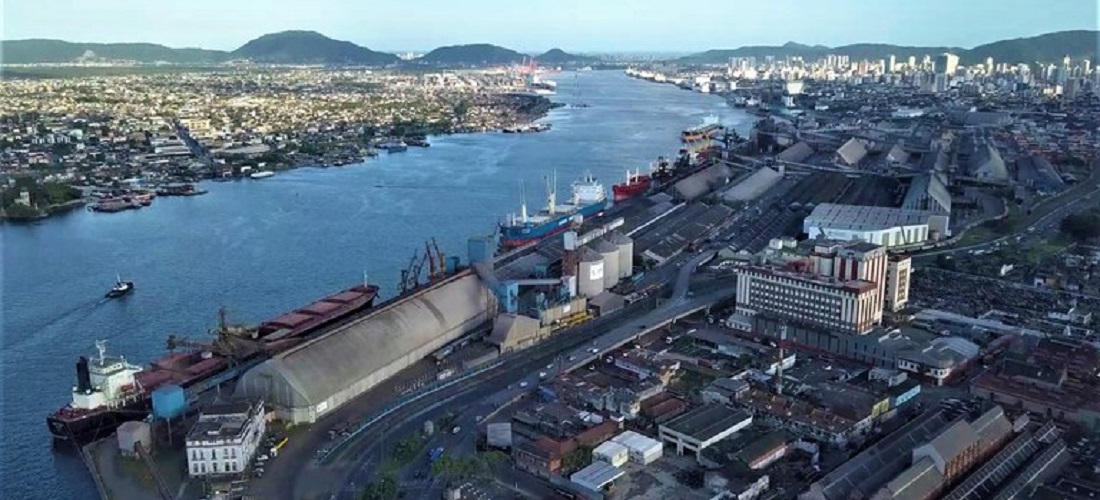
Study disclose climate risks and adaptation measures for Aratu, Rio Grande, Santos
Dec, 07, 2022 Posted by Gabriel MalheirosWeek 202249
Brazil’s National Waterway Transportation Agency (Antaq) released, on December 6, case studies developed during the second phase of the investigation “Impacts and Risks of Climate Change in Public Ports.” The new research presented climate risks and adaptation measures for Santos, Aratu, and Rio Grande ports. The work in partnership between Antaq and the German Cooperation for Sustainable through Deutsche Gesellschaft für Internationale Zusammenarbeit (GIZ) GmbH.
The study identified climate risks in two time periods, from 2021 to 2040 and from 2041 to 2060, with the goal of showing the linear progression of these events from now to 2060. In addition, the study detailed the climatic threats most likely to occur in each of the ports, listing the main structural and operational risks to which the terminals are subject and the adaptation measures to counter them.
According to the study, the Port of Rio Grande is at the most risk. The interaction of port infrastructure with increased frequency and intensity of winds blowing in a south-southwest orientation can result in increased maintenance demand, higher operating costs, and reduced operational capacity. In addition, heavy and persistent rains posed additional challenges to port operations.
As for the Port of Santos, the study showed that the climatic threat most likely to hit the port is heavy rains, which is labeled a ‘medium’ risk. The threat’s occurrence is expected to continue in the near future, exposing the External Channel, Internal Channel, and Maneuvering Basin to ‘moderate’ risks. Rains may impact the terminal’s road access and lifting equipment, among other things.
The solution for this situation is to monitor weather conditions to allow physical integrity of fixed, mobile, or transfer cargo equipment; to partially restrict the navigation channel; or repair buildings, equipment, and damaged structure.
In the Port of Aratu, the study indicated that persistent rains will be “persistent” in the region, becoming the biggest cause of concern, mainly for the movement of solid products, which cannot be operated in conditions of greater humidity. Heavy rain and flooding due to rising sea levels also presented a ”medium” risk.
According to the document, the studied ports already have recurring histories of stoppages due to these bad weather conditions. None of them is fully prepared for the increase in extreme weather events.
Adaptation measures
The survey presented the most urgent measures classified as management, maintenance, or planning measures for each threat and its impact on infrastructure.
In general, the possible measures to reduce risks are the creation of systematized databases on operational stoppages and damage caused by weather events; improvement in maintenance processes; investments in systems adapted for new climate patterns; establishing monitoring approaches; the change in operating conditions; and the creation of working groups to plan and implement the measures.
Phases of the study
The first phase of the study, presented in November 2021, displayed the main climate threats to 21 Brazilian public ports – windstorms, storms, and rising sea levels. The climate risk analysis included 21 public coastal ports in the country. They are: Angra dos Reis (RJ), Aratu-Candeias (BA), Cabedelo (PB), Fortaleza (CE), Ilhéus (BA), Imbituba (SC), Itaguaí (RJ), Itajaí (SC), Itaqui (MA ), Natal (RN), Niterói (RJ), Paranaguá (PR), Recife (PE), Rio Grande (RS), Rio de Janeiro (RJ), Salvador (BA), Santos (SP), São Francisco do Sul ( RS), São Sebastião (SP), Suape (PE) and Vitória (ES).
The document outlined 55 port-related actions, 21 of which are infrastructure-related measures and 34 non-structural steps, such as diversifying land connections to the port/terminal, building shelter infrastructure, expanding the dredging process, and improving the quality of access to the port/terminal.
In the second phase of the study. The three ports listed above were selected considering the climatic risks they face, in addition to their economic relevance and regional representativeness. The study was carried out by I Care, with the participation of the Brazilian Navy, port authorities – Codeba, Portos RS, and Santos Port Authority – and port operators.
-
Sugar and Ethanol
Oct, 19, 2022
0
Brazil exports 1.635 million t of sugar in October
-
Economy
Oct, 01, 2024
0
Climate events to slash over 12% of Latin America’s GDP by 2050
-
Dec, 01, 2021
0
Loaded ferry sinks at Porto do Chibatão in Manaus
-
Shipping
Apr, 18, 2023
0
COSCO Shipping Ports achieves slight container growth in March

